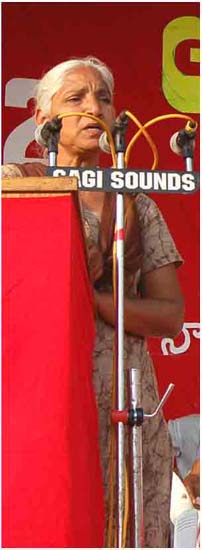
Red Salute to Comrade Jita Kaur
Comrade Jita Kaur passed away on 23 June after a battle with cancer. She was a mass leader whose life’s work in the party spanned a wide range – from Gorakhpur in eastern UP, to Lucknow and Delhi and finally in rural Punjab – that would be unusual for anyone, and is especially remarkable for a woman.
Comrade Jita Kaur was drawn into the ML movement through her active participation in the student’s movement in Gorakhpur. She became an activist of the PSO, Gorakhpur at a time when the entire state of Uttar Pradesh was seething with student’s protests against academic anarchy and hold of anti-socials and criminals enjoying political patronage of bourgeois political parties, in the campuses. In her early days Jita was an idealist who had seen through the sham of religious ideas. Jita’s joining a revolutionary left organization had its impact on her personal life, her father Sardar Rattan Singh being a Congress leader as well as well known religious leader in Gorakhpur. As a woman, Jita continued to fight her battle in the conservative background of her home and the feudal-patriarchal milieu in this backward district of Purvanchal. After she finished her post-graduation, Jita began to take keen interest in the women’s movement, and formed the Jagrit Mahila Parishad in the District. She was an ardent activist who combined the aspirations of young middle class women with those of the most downtrodden sections of society. In the process she also became associated with the Indian People’s Front in Uttar Pradesh. As a leader of the UP IPF, Jita got involved in the struggle of people being displaced from Ramgarh Tal area in Gorakhpur. The Ramgarh Tal Pariyojana was posing a grave threat to the livelihood of the local inhabitants and to ward off their fear and insecurity, Jita left her home and began to live with the affected people. In the process she began to build a new mass-base for the IPF. Jita not only became popular as a mass leader fondly called didi, she became immensely loved by the women there and built a women’s movement there. Jita had played a major role in involving several intellectuals and women of the town in support of the people of the Tal. She contested Assembly elections in Gorakhpur on the IPF banner.
Comrade Jita began to organize women activists in the state and in the process also met and involved Ajanta Lohit in IPF work. She later became a State Committee member of the CPI (ML). Following the founding conference of AIPWA was being held in Delhi, Jita became associated with AIPWA work in Delhi and also became a State Committee member of the Party in Delhi. She built the organization from scratch and also became the National Secretary of the AIPWA. In that capacity, she visited Uttarakhand, Punjab, MP and Bihar for AIPWA programmes. She was also very active in the joint women’s movement and became popular with women’s activists from other streams. She was an active participant in the joint women’s conferences held in Patna and Calicut. The Central Office of AIPWA in Delhi was entirely managed by her in the most creative, living and economic way. Battered women, women marrying against their parents’ wish, or going for inter-religious marriages, girls thrown out of home or those fighting against patriarchal attitude of in-laws or husbands would find the AIPWA office a place of strength and succour.
In Delhi Jita organized Party work in East Delhi and North-West Delhi. With the movement in Punjab expanding, she was needed there, and she began to work in Mansa. She was a State Committee member of the Party there and also an AIPWA organizer. She streamlined the State Party Office in Mansa and encouraged many young activists and women to work as whole-timers in the Party. In this final phase of her life, just as at the first phase of her political activism in Gorakhpur, she was in her element – once again at the forefront of mass struggles of the rural poor.
She was diagnosed with gall bladder cancer in November 2006, and underwent treatment in AIIMS. Throughout her illness, she drew strength from comrades who would visit her from all over the country, and at her side in this battle with cancer at every stage were Srikant and Upali at whose house she spent much of her time as she underwent chemotherapy and radiotherapy. She breathed her last on the morning of 23 June.
Comrades will always remember her tireless energy, her warm and affectionate comradeship, her outspokenness. In the many memorial meetings that were held – from Gorakhpur to Lucknow, several places in Uttarakhand, to Delhi to Patna and Punjab, many women remembered her as the person who drew them into political activism.
Comrade Jita, you will always live in our hearts and continue to inspire generations of activists!